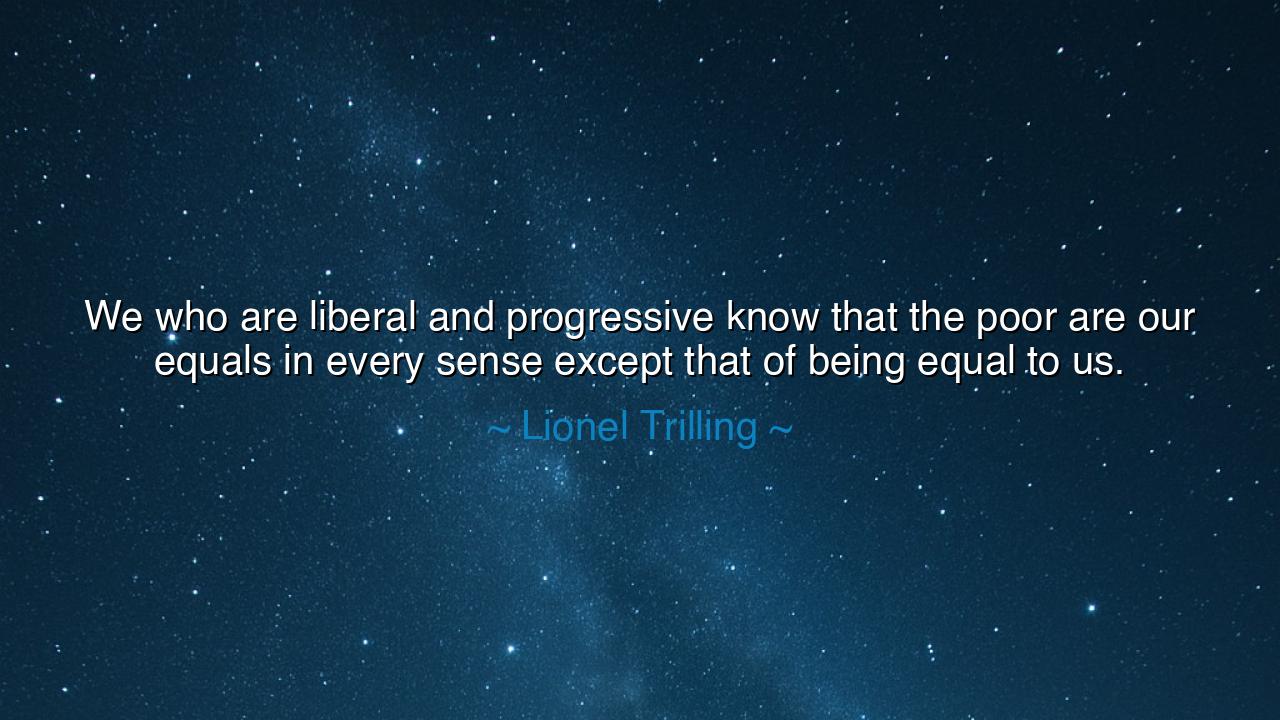
We who are liberal and progressive know that the poor are our
We who are liberal and progressive know that the poor are our equals in every sense except that of being equal to us.






The words of Lionel Trilling—“We who are liberal and progressive know that the poor are our equals in every sense except that of being equal to us.”—are like a mirror held before the conscience of humankind. They gleam with irony yet pierce with truth, revealing the quiet hypocrisy that often hides behind noble ideals. Trilling, the philosopher and critic of the mid-twentieth century, was no enemy of progress, but a friend to honesty. In this single sentence, he stripped away the illusion of moral superiority that even the well-meaning carry—the comforting belief that to sympathize with the poor is the same as to see oneself among them. His words remind us that compassion without humility is pride in disguise.
The origin of this quote lies in Trilling’s critique of modern liberalism, particularly in the Western world. He lived in an era when intellect and reform were worshiped as instruments of moral progress, yet he saw how even those who preached equality often clung to a hidden sense of privilege. To declare that “the poor are our equals” costs little when uttered from comfort. The heart of Trilling’s insight lies in the second half of his sentence: “except that of being equal to us.” Here he unveils the subtle arrogance that poisons compassion—the belief that we, the enlightened and educated, are somehow still above those we claim to champion. His wit carries the sting of a prophet’s rebuke, urging every generation to examine the purity of its mercy.
Throughout history, this paradox has repeated itself. In the grand salons of the French Revolution, men proclaimed liberty, equality, fraternity, while living in luxury as the peasants starved. In the age of empire, reformers spoke of bringing civilization to the “less fortunate,” blind to the arrogance of their own assumption of superiority. And even in our time, we see this same contradiction—the philanthropist who helps the poor but refuses to sit beside them, the activist who fights for justice but secretly pities those he claims to uplift. Trilling’s words strike at this ancient wound in the human spirit: the inability to see the poor not as subjects of pity, but as mirrors of ourselves.
Consider the story of Mahatma Gandhi, who sought to bridge this very divide. Though educated in the halls of London, he cast aside fine clothes and wealth to walk among the poor of India barefoot and humble. When asked why he did so, he replied that one cannot understand the pain of hunger or the dignity of poverty unless one shares in it. Gandhi’s greatness did not lie in his words alone, but in his identification with the lowest, his willingness to see no difference between himself and the least of his brothers. In this, he achieved what Trilling warned others had failed to do—he became equal not only in spirit but in circumstance.
Trilling’s quote also unveils the spiritual dimension of equality. It is easy to proclaim that all souls are equal before God; it is far harder to live as if this were true in the marketplace of life. The poor man’s voice is often unheard not because others silence him, but because the proud believe they already understand his needs. The true test of equality, then, is not in law or charity, but in the posture of the heart. Do we kneel beside the suffering, or do we stand above them, extending our aid like kings dispensing mercy? The one who truly believes in equality will see the poor not as broken versions of themselves, but as teachers in humility and endurance.
The lesson, therefore, is both humbling and profound: do not mistake benevolence for equality. To give money is easy; to give respect is divine. To speak of justice from comfort is simple; to live it among hardship is sacred. The next time you act in kindness, ask yourself—do I serve from love, or from pity? Do I see my own reflection in those I help, or only my virtue? For it is not enough to lift others; one must also lower one’s own pride. As the ancients taught, the highest must stoop to touch the lowest, or both remain incomplete.
So, my child, remember Lionel Trilling’s wisdom as a warning and a guide. To call others your equals, you must first cast off every chain of pride and illusion. Walk among the forgotten, not as a savior but as a brother. Listen to those whom society overlooks, for they will remind you of your own humanity. When you see the poor, see not distance but reflection—for the line that divides us is drawn not by fate, but by fear.
And thus, let Trilling’s irony become your awakening: that equality is not a gift the powerful give to the powerless, but a truth that humbles all alike. When you understand this, you will no longer merely help the poor—you will become one with them in spirit, and through that unity, rediscover the true meaning of compassion.






AAdministratorAdministrator
Welcome, honored guests. Please leave a comment, we will respond soon